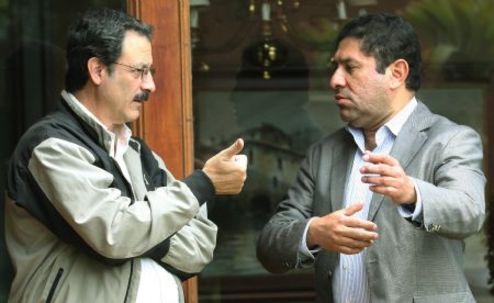Talks between the representatives of Manuel Zelaya, deposed president of Honduras, and representatives of the post-coup regime ended without any agreement.
 |
|
Mauricio Villeda, (L) representative of Honduras' interim President Roberto Micheletti, speaks with Milton Jimenez representative of ousted Honduran President Manuel Zelaya during negotiations in San Jose July 19, 2009. Talks to resolve Honduras' political crisis dragged into a second day on Sunday, with negotiators for deposed President Manuel Zelaya and coup leaders deadlocked over his proposed return to power. [Xinhua] |
Carlos Lopez, who led the delegation from the post-coup regime, told media in Costa Rican capital San Jose that it could only accept the return of Manuel Zelaya, the president who was kidnapped from the presidential residence on June 28 and forced to leave Honduras, providing he agrees to submit to charges including treason.
Rixi Moncada, who led the team that represented Zelaya, said the delegation could not accept anything short of Zelaya's restoration, which was in line with the resolutions adopted by the Organization of American States and the United Nations.
Lopez had earlier described any call for the restoration of Zelaya as "interfering" in Honduras' internal affairs.
On Saturday, Arias presented a compromise plan under which Zelaya would return to office in a unity government. Other elements of the plan include an amnesty for all crimes committed before and after the coup, the moving up of presidential elections scheduled for November to October, the army, which toppled Zelaya, submitting to the electoral authorities the month before the elections, and Zelaya's shelving any campaign for constitutional reforms.
"I am sorry but your proposal is not acceptable," Lopez told a press conference, where Arias was present. "We made a counter proposal ... under which the constitutional president, Roberto Micheletti, agreed to step down in exchange for Mr. Zelaya returning to face trial for his crimes," said Lopez, who is also Foreign Minister for Micheletti, who took power hours after the military coup, in a legislative session that began with the reading of a letter, allegedly from Zelaya, in which Zelaya allegedly resigned on health grounds.
Lopez also insisted that the events of June 28 did not constitute a coup, saying that the Supreme Court had ordered Zelaya's arrest for violating the constitution, which Lopez called "a crime in any civilized nation".
Moncada responded that Zelaya's officials had been exiled against their will, but remained open to talking via Arias, who she said enjoyed the recognition of the United Nations, the international community and the Organization of American States.
"The dialogue with this regime that was the product of a military coup is over due to intransigence," she said.
Speaking at the same press conference, Arias asked both sides to return within three days in a bid to avoid civil conflict in Honduras.
"Many of Honduras' people have arms. What happens if one of them shoots a soldier or soldier should shoot armed citizen?" Arias asked, adding that civil war was one of the possibilities.
(Xinhua News Agency July 20, 2009)